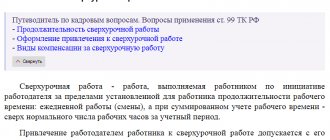Home / Labor Law
Back
Published: 12/11/2019
Reading time: 3 min
4
691
Many people work at night—factory workers, convenience store clerks, restaurant and gas station employees. Such work is paid higher than during the day, but it turns out that not everyone can work at night. Even if they really want to. There are categories of citizens who will not be accepted on the night shift under any circumstances.
- Legal standards
- Who is prohibited from working at night Strictly prohibited
- Who can work only with their written consent
What does the Labor Code say?
Article 96 of the Labor Code determines that night work can take into account the hours that fall between 10 pm and 6 am. Only if more than 50% of a person’s time at work falls during this period, his work is considered night and has additional pay.
Under current laws, a standard night shift is 60 minutes shorter than a day shift. For example, if the staffing schedule specifies 8 hours, work after 10 p.m. is set to 7, and the missing time is not required to be worked.
In some cases, the employer is required to reduce hours at night, including:
- the employment contract specifies the person’s night work type;
- the employee initially works on a reduced schedule;
- employees work in shifts and have one day off per week.
The legislation establishes some nuances and restrictions on work at night:
- When reducing work on night shifts, the employer does not have the right to impose sanctions on employees or reduce wages. The change is considered complete.
- A night shift can be the same length as a day shift if the company's operations require employees to perform their duties full time, or if employees work shifts 6 days a week.
- The law establishes a list of citizens who are prohibited from being involved in night shifts, regardless of their duration or duties.
- Some employees can be involved in night shifts only after receiving written consent, providing them with an order for familiarization and allowing them to refuse without imposing sanctions or fines.
- If the enterprise employs employees of the media or creative professions, the night regime is stipulated in the collective labor agreement. In some cases, confirmation from the commission about the need to introduce a night shift is required.
How is it paid?
Article 154 of the Labor Code of the Russian Federation explains that the work of a person engaged in the labor process from 22 to 6 hours must be paid in an amount increased compared to the day shift.
The exact amount of the additional payment is stipulated in the collective or employment contract. Remuneration for activities during a given period cannot be less than the minimum increase in pay for night work established by the Russian Government. The government sets this minimum amount, taking into account the proposals of the Tripartite Commission for the regulation of social and labor relations.
The document regulating this minimum is the Decree of the Government of the Russian Federation No. 554 of July 22, 2008, which states: the minimum is an additional payment of 20% of the hourly rate or salary per hour . But the upper limit is not established by law, that is, the organization can choose how much to increase the payment for work at night.
The decision to increase must be recorded in the collective agreement in force at the enterprise and in the labor agreement concluded with the contractor. The employer, when signing the amount of additional payment for such work, becomes familiar with the position of the representative body of the team.
Certain categories of workers who go on night shifts are approved for a special pay rate.
35% Employees receive additional payments:
- railway transport and metro;
- river shipping company;
- housing and communal services;
- trade and catering;
- motor transport (where there is no shift work);
- fire, paramilitary and security guards.
50% receive additional payments:
- workers producing pasta.
75% employees are paid extra:
- yeast factories (with shift or continuous labor organization);
- textile workers;
- plywood production.
100% receive additional payments:
- workers in the baking, flour and cereal industries.
Calculation for hourly wages
Compensation for night work in this case is usually calculated as follows. If an employee receives 100 rubles for an hour worked during the daytime, then 20% is added to the specified amount for an hour worked during the night period. That is, an hour now costs 120 rubles, and an eight-hour shift costs 960 rubles (the entire additional payment per night is 160 rubles).
Calculation for salary scheme
Let’s assume that an employee is registered with a salary of 20 thousand rubles. In the billing month, he has 22 shifts lasting 8 hours, of which six shifts are night shifts. Average daily earnings will be:
- 20,000 / 22 = 909.1 rubles.
Now you can calculate the additional payment for one shift:
- 909.1 x 20% = 181.82 rubles.
Total surcharge amount:
- 181.82 x 6 = 1090.92 rubles.
Considering that the number of night shifts may vary each month, the additional payment also varies.
It happens that night work overlaps with a holiday. How is the work shift paid in this case? The Labor Code of the Russian Federation explains that a person working on a holiday, which is a non-working day, will receive a summed additional payment - for work both on the holiday and at night. The result is: the basic rate + an additional payment of at least a single rate for hours that fall on a holiday + an additional payment for each hour of work at night.
Compensation for night work is the employer's duty. If the employer does not pay for such activities, then the worker appeals to the trade union organization, and if this does not help, then he goes to court to protect his interests.
Who is not allowed
There are several situations that prohibit night shifts:
- according to the employment contract, the employee works during the day;
- a person works under the condition of reduced working hours;
- employees cannot work at night, since such a ban is established in internal legal acts.
Regardless of working conditions, the following groups of citizens cannot work at night:
- pregnant employees;
- imperfect employees, except those involved in work of an artistic nature.
Night work time tracking
According to Part 3 of Art. 91 of the Labor Code of the Russian Federation, the employer is obliged to keep records of the time actually worked by each employee. For this, the unified form T-13 “Working Time Sheet”, approved by Resolution of the State Statistics Committee of the Russian Federation dated January 5, 2004 N 1, can be used. In this case, the timesheet is filled out as follows. In the top lines of column 4, opposite the employee’s last name, enter the night work code (code “N” or “02”), and in the bottom lines indicate the duration of work in hours and minutes. If an employee starts working during the day and then continues at night, then a second line for the same employee can be provided on the time sheet. In these lines, you should separately indicate the operating hours during the day (code “I” or “01”) and at night (code “N” or “02”).
However, for this it is necessary to know the standard working time for certain periods (month, quarter, year), which is calculated based on the calculated schedule of a five-day working week with two days off in accordance with clause 1 of Order No. 588n * (1). It is calculated based on the duration of daily work (shift) and is:
- with a 40-hour work week - 8 hours;
- if the working week is less than 40 hours - the number of hours obtained by dividing the established working week by 5.
We would like to add that on the eve of non-working holidays, working hours are reduced by one hour.
In accordance with Part 2 of Art. 112 of the Labor Code of the Russian Federation, if a day off coincides with a non-working holiday, the day off is transferred to the next working day after the holiday. If the suspension of work in an institution is impossible on non-working holidays due to production, technical and organizational conditions, then the transfer of days off provided for in Part 2 of Art. 112, is not implemented (clause 2 of Order No. 588n).
The standard working time calculated in the prescribed manner applies to all work and rest regimes.
How to translate
If a citizen initially signs an employment contract with working hours from 10 pm to 6 am, then the manager must make sure that the person understands the need to regularly work at night.
If a person was initially employed during the daytime, but at work it became necessary to work at night, the employer is obliged to notify the employee 30 calendar days in advance about the change in schedule.
One of the benefits for workers is additional pay for night shifts. Not all employees know at what point the additional payment begins. For example, if a person goes to work at 8 pm, the salary increase will begin at 10 pm, and the previous 2 hours will be paid at the standard rate.
Some employers are trying to save money by not notifying citizens about the necessary salary increase. Employees must remember that they are required to receive notice before shifting to night shifts, and some categories of citizens must give their written consent.
What does payment for night working periods depend on and how is it calculated?
The main points on which the amount of payment for such work will depend:
- Minimum wage (minimum wage) at night, determined by the state;
- The amount of increase accepted by the head of the enterprise;
- Number of night hours worked between 10 pm and 6 am.
Naturally, under different conditions of night work, the additional payment will differ. For example, with a fixed salary, the hourly tariff rate is first calculated, and the resulting value is multiplied by the surcharge coefficient adopted at the given enterprise. If a night assignment falls on a business trip, then, according to current legislation, you must pay at least 20% of the hourly rate.
But it is not necessary to pay for the time that the employee spent while en route to his destination. Moreover, the employer can pay for night time spent on the road at its discretion.
From what time are they counted?
The Labor Code establishes that the amount of bonus for night shifts should be 20% of the salary.
Night hours start at 10 pm, the exact amount of the increase is indicated in the organization’s internal documentation. The Tax Service has collected statistics according to which the average salary increase is 40%.
There are several categories of employees who can count on increased rates:
| 35% | if the organization provides guard or security services |
| 35% | for employees of penitentiary organizations |
| 50% | employees of healthcare institutions |
In all other cases, each hour of night work is paid at the discretion of the organization’s management, but the amount cannot be less than that established by the Labor Code. To correctly calculate working hours, you need to take the monthly salary and divide it by the number of working days according to the staffing schedule.
The resulting number is divided by the number of hours in a standard work shift. This figure shows how much a person earns on a day shift.
To calculate the correct hourly earnings for the night, you need to multiply the resulting figure by the percentage established in the company; this can be clarified in the accounting department.
To find out the salary per day, you need to multiply the number by the number of hours in one shift. Accordingly, if a citizen works 8 shifts at night, daily earnings must be multiplied by 8 to find out the monthly salary for this time.
Surcharge rates in various industries
According to statistics, different industries apply different types of rates for additional payments for this time of work. On average, bonuses are around 40% of the salary. For what types of organizations and categories of people do increased values apply:
- Performing security, guard and other similar types of work - 35 percent;
- Employees working in the penal system - 35%;
- Healthcare workers - 50%.
As has already been noted, in other cases, the assignment of an allowance for performing work at night remains the responsibility of the organization’s management, but should not be less than 20% of the hourly wage rate.
Many professions, due not only to work on the night shift, but also for the harmfulness of the work (stokers, coal miners, etc.), also require other additional payments.
How long are night shifts and how many are there?
Night work hours according to the Labor Code of the Russian Federation in 2021 are shorter than the standard day by 1 hour. Sometimes situations arise that make the time even shorter:
- Article 92 of the Labor Code establishes that if an employee works less than 8 hours a day and the working week does not exceed 36 hours, then the shift must be shortened to fit into the norm.
- If an employee works only at night, the number of work shifts and their duration are included in the contract.
- If the organization has 6 working days per week.
- If required to fulfill obligations.
Teenagers work with shortened working hours, but they are prohibited from being involved in night shifts. Disabled people and workers in hazardous industries have the right to leave after 10 pm, but only with their written consent.
What time does the night electricity tariff start from?
There are 3 options for charging electricity consumption:
- single;
- two-zone;
- three-zone.
The payment coefficient is uniform and constant; the time of day does not affect it.
If a single tariff is established, a traditional meter without differentiation is used to calculate costs. It is used only by those consumers who do not want to change equipment.
To use a two-zone tariff, you must install a two-tariff meter. The equipment will calculate the level of consumption in different time zones: from 7:00 to 23:00 the daily, more expensive tariff is valid. At 23:00 the device starts calculating costs at the night rate. When calculating payments for services, it is necessary to multiply the data from the meter by the tariff established in the region. In the utility receipt, the data is entered in 2 lines (for day and night tariffs).
The three-zone tariff works on a principle similar to the two-zone one, but the time frame is slightly different:
- the night rate is valid from 23:00 to 7:00;
- semi-peak zones include the intervals from 10:00 to 17:00 and from 21:00 to 23:00;
- Peak times are from 7:00 to 10:00 and from 17:00 to 21:00.
Payment
When an employee starts work, an employment contract is concluded with the employer, which stipulates the number of hours that a person must work in order to receive a full salary.
If an employee works beyond the established hours, he is entitled to additional payment for overtime, but in an amount not exceeding the overtime payment for other (day) employees.
The Labor Code establishes that night hours are paid in accordance with the additional payment established by the internal documentation of the organization and the amount of time worked.
For example, an employer decided to pay the minimum allowable additional payment of 20%, and an employee who receives 500 rubles per hour worked 10 night hours in a month.
To calculate wages for night hours you need:
(Amount per hour) / (Percentage rate of surcharge for night shift) * amount of time worked = (500 * 0.2) * 10 = 1000 rubles
Surcharge
Article 154 of the Labor Code of the Russian Federation clearly regulates the minimum amount of additional payments. The additional payment for the night shift must be at least 20% of the premium. Although the heads of budgetary organizations can themselves set the amount of these additional payments, they cannot make an additional payment below the minimum established level of 20%. All additional payments and their amount must be documented. For example, here are the documents that may stipulate pay and working conditions at night:
- In the Regulations on remuneration.
- In the Regulations on pay for night work.
Also, working conditions and the procedure for additional payments for time worked can be stipulated by order, but this is possible if the employee is hired once. An order is also needed if an employee on a special list is involved in such work.
To involve an employee in night work, his written consent is first required. An order to attract an employee is issued in free form and only on the basis of this document.
In some cases, working conditions and payment procedures are specified in the employment contract with a specific employee.
Employee consent
Some employees must provide written consent to switch to night work. This category includes disabled people and workers in enterprises if this work involves risks to life or health.
Consent is issued by the citizen personally and confirmed with a date and signature. The document states that the person is ready to work from 10 pm to 6 am. In addition to consent, a disabled person is required to undergo a medical examination and provide an opinion on the ability to carry out activities at night.
The document must indicate the following information:
- employee information;
- employer information;
- the body of the document, which specifies working hours and consent;
- date and signature of the employee.
When consent is given to the manager, he issues an order to change the schedule and switch to night work. The order is accompanied by the consent of the employee and, if any, the conclusion of a medical expert.
Consent is drawn up in free form; no requirements are provided for by law. It is checked by the HR department and then forwarded to the director. The result is that the employee is assigned to night shifts and the salary calculation is changed.
The form can be downloaded from the link.
Basics of engaging in night work
The main provisions regarding night work are listed in Art. 96, 149, 154, 224, 259, 268 Labor Code of the Russian Federation. At the same time, Part 1 of Art. 96 stipulates that night time is considered to be work in the interval from 22.00 to 6.00. Labor legislation establishes restrictions on recruitment to night work. So, in Art. 96 names categories of persons who cannot be involved in night work, even if this time only accounts for part of the work:
— pregnant women (Article 259 of the Labor Code of the Russian Federation);
- workers under the age of 18, with the exception of persons involved in the creation and (or) performance of artistic works, and athletes (Articles 268, 348.8 of the Labor Code of the Russian Federation).
Article 96 of the Labor Code of the Russian Federation also establishes categories of persons who are allowed to work at night only with their written consent and provided that such work is not prohibited for them for health reasons in accordance with a medical report. These include:
- women with children under three years of age;
— disabled people and employees with disabled children;
- workers caring for sick members of their families in accordance with a medical certificate issued in the prescribed manner;
- mothers and fathers raising children under the age of five without a spouse, as well as guardians of children of this age.
The named persons must be informed in writing of their right to refuse to work at night, and therefore the form of the document under which the employee’s approval signature is placed must contain excerpts from Art. 96 of the Labor Code of the Russian Federation on his right to refuse to work at night.
For your information. The guarantees provided to women in connection with motherhood, in particular, the restriction of work at night, apply to fathers raising children without a mother, as well as to guardians (trustees) of minors (Article 264 of the Labor Code of the Russian Federation).
Please note that in terms of familiarizing employees with the right to refuse to work at night, the following options are possible.
If night work is determined by the working hours itself (for example, shift work), then the employee can be made aware of his right to refuse such work once - at the moment when the appropriate work schedule is established for the employee.
If the need to work at night arises from time to time, then the employee should be informed in writing each time of the right to refuse such work.
Consent to night work may also be expressed in the job application. The details of such an application, together with the details of a medical report indicating that night work is not prohibited for the employee for health reasons, should be indicated in the employment contract.
Let us clarify that the procedure for issuing certificates and medical reports by medical organizations to the categories of employees in question is currently established by Order of the Ministry of Health and Social Development of the Russian Federation dated May 2, 2012 N 441n. Disabled workers in accordance with Art. 11 of the Federal Law of November 24, 1995 N 181-FZ “On the social protection of disabled people in the Russian Federation”, an individual rehabilitation program is issued, mandatory for implementation by organizations of all forms of ownership and providing recommendations for performing work at night.
It should also be noted that, for personal reasons, employees may hide the fact that night work is contraindicated for them, for example, for health reasons or due to the fact that they are caring for disabled children. Here the employer’s hands are tied - he cannot verify the accuracy of the information provided by the employee and does not have the right, when applying for a job, to request documents from the applicant other than those provided for in Art. 65 of the Labor Code of the Russian Federation, except for the case when the obligation to request additional documents is established by federal laws, decrees of the President of the Russian Federation or decrees of the Government of the Russian Federation. And if during the course of their work it becomes clear that an employee’s right to work at night is limited, the employer will not be held liable. But such an employee will need to be transferred in accordance with Art. 73 of the Labor Code of the Russian Federation for other available work that is not contraindicated for him due to health reasons. If the employee refuses the proposed transfer or there are no suitable jobs in the institution, the employment contract can be terminated on the basis of clause 8 of Part 1 of Art. 77 Labor Code of the Russian Federation.
If an employer knew about medical contraindications, but still hired an employee to work at night for whom such work is contraindicated for health reasons, then he may be held administratively liable.
When recruited to work at night, it must be remembered that depending on the category of employees and the type of work performed, the duration of duties at night can be normal or reduced.
It should also be taken into account that, according to parts 4 and 5 of Art. 103 of the Labor Code of the Russian Federation in a situation where employees are hired for shift work, the following are established:
- prohibiting them from working for two shifts in a row (for example, immediately after working on a night shift, they cannot continue to work on the next shift);
— the employer’s obligation to bring shift schedules to the attention of employees no later than a month before implementation.
Advantages and disadvantages
The most important advantages of night shifts are:
- Free daytime; the employer does not have the right to force an employee to work around the clock. If a person goes out at night, daytime hours are left to his discretion.
- Increased salary. A person’s salary increases by at least 20%; in some enterprises it increases up to 50%. Competition for such positions is almost always lower, and it is easier to find a job.
- Management is almost always not at work on the night shift, and there are no collective meetings or reviews of the enterprise’s activities.
There are also disadvantages to night work:
| Negative health effects | It is not recommended for pensioners and pregnant women to go out at night. The body does not benefit from activity after 12 am |
| Personal difficulties | If the rest of the family members work during the day, then they will practically not see the night employees. Students will also not be able to go to school in the morning. |
| Inability to get enough sleep | During the day, household members or neighbors may make noise, disturbing the employee’s sleep |
Night work hours are regulated by internal documents of the enterprise or an employment contract with the employee. Not a single provision in the papers can contradict the Labor Code.
Disadvantages of the night tariff
The differential tariff has not only advantages. The multi-tariff system also has several disadvantages:
- With the increase in nighttime electricity consumption, users have to monitor the operation of home appliances in the dark. As a result, a person’s daily sleep and wakefulness patterns are disrupted, which is fraught with health problems.
- If devices are left to operate unattended, there is a high risk of fire or flooding.
- Noisy household appliances, such as a washing machine, can prevent neighbors or family members from getting a good night's sleep.
Another disadvantage is the initial cost of installing a new meter. However, when using a two-tariff meter, the savings are so great that they will pay for themselves in the first year.
Example of compensation calculations for night work
Payment at night for certain categories of employees A special amount of payment is provided for certain categories of employees: 1. An additional 35% is paid:
- railway and metro workers;
- workers working on river ships;
- housing and communal services workers;
- trade and catering workers;
- employees of motor transport companies, in the absence of shifts;
- workers of guard, paramilitary, fire protection.
2. 50% additional payment:
- workers working at pasta factories.
3. 75% additional payment:
- yeast factory workers working in shifts or continuously;
- textile workers;
- workers in plywood factories.
Zvezda LLC provides for a 5-day work week, lasting 40 hours. The organization works in 3 shifts, lasting 8 hours:
- from 9:00 to 17:00 - first shift. Pavlov worked;
- from 17h to 01h - second shift. Sidorov worked. Night time 3 hours;
- from 01:00 to 9:00 - third shift. Komarov worked. Night time 5 hours. The tariff rate is 200 rubles per hour.
For night shifts, a 20% premium is provided to the rate per hour of work (established by the Regulations on Remuneration). The employees worked in full the monthly norms:
- in January - 128 hours;
- in February - 159 hours;
- in March - 167 hours.
When employees are given a salary (for example, 20 thousand rubles), the calculation will look like this: Pavlov’s salary for January, February and March was 20,000 rubles each; Sidorov's salary was:
- for January: 20,000 rubles 20,000 rubles / 128 hours * 48 hours * 20% = 21,500 rubles;
- for February: 20,000 rubles 20,000 rubles / 159 hours * 60 hours * 20% = 21,509 rubles;
- for March: 20,000 rubles 20,000 rubles / 167 hours * 63 hours * 20% = 21,508 rubles.
Similarly, Komarov’s salary will be:
- for January: 22,500 rubles;
- for February: 22515 rubles;
- for March: 22514 rubles.
There are 2 options possible:
- At increased piece rates for the quantity of product manufactured at night, when the production of a certain type of finished product takes no more than an hour,
- According to the formula: (Product production per month * Price per unit) / Number of hours worked (total) * Number of night hours * Additional payment for night time - in the case when the product manufacturing process takes more than a day.
Zvezda LLC has a piece-rate wage system - 90 rubles per unit of goods. Night time is paid at a rate of 20% of the established rate. 3 units are produced in 1 hour. goods. Within a month, Pukhov produced 350 units. goods per day shift and 20 units. per night.
Payroll: 350 units. * 90 rubles/unit. 20 units * 90 rubles/unit. × 20% = 31,860 rubles. In the case where the production process is long: the piece rate is 5,000 rubles per unit of finished product.
At the same time, 10 units were produced per month. goods. Amount of time worked: in total for a month - 130 hours, incl. night shift – 15 hours. For manufactured goods, Pukhov will receive: 10 units. * 5000 rubles = 50000 rubles.
Additional fee for night work: 10 units. × 5000 rubles / 130 hours × 15 hours × 20% = 1154 rubles. Accrued wages: 50,000 rubles 1,154 rubles = 51,154 rubles.
Human physiology requires rest at night and wakefulness during the day, so those who work at night have a doubly difficult workload to bear. Especially for such employees, the Labor Code establishes norms regulating their right to receive a salary with an allowance. Content
- 1 What is night work and how is it paid?
- 2 Payment at night for certain categories of workers
- 3 Some points related to payment for night work
- 4 Example of compensation calculations for night work
What is night work and how is it paid? According to Art.
96 TK, night time is considered to be from 22.00 to 6.00 am. Work during this period is recognized as night work. The employment contract specifies working hours; the employee signing the contract additionally signs his consent to work at night.
Terms of payment for evening and night work hours
Therefore, when setting an hourly tariff rate, it can be calculated taking into account the surcharge for night work. At the same time, this option of establishing an hourly tariff rate is not very convenient, especially if the employee is hired to work not only at night.
In addition, in the event of an inspection by the labor inspectorate, each time you will have to confirm the fact of increased payment for work at night by calculation. Therefore, it is more convenient to set a separate tariff rate and a separate surcharge for night work.
In practice, there are cases when the employer includes additional payment for night work in the monthly bonus. The consequences of such actions are such that the inclusion of an additional payment for night time in the monthly premium will lead to a distortion of the meaning of Part.
We suggest you read: What is the term for causing grievous bodily harm?
1 tbsp.
- in February - 159 hours;
- in March - 167 hours.
Thus, Pavlov's salary:
- for January: 200 rubles/hour * 128 hours = 25,600 rubles;
- for February: 200 rubles/hour * 159 hours = 31,800 rubles;
- for March: 200 rubles/hour * 167 hours = 33,400 rubles.
Payment for work in the evening and night time Sidorov:
- for January (night 48 hours): 200 rubles/hour * 128h 200 rubles/hour * 48h × 20% = 27520 rubles;
- for February (night 60 hours): 200 rubles/hour *159 hours 200 rubles/hour * 60 hours * 20% = 34,200 rubles;
- for March (night 63 hours): 200 rubles/hour * 167h 200 rubles/hour * 63h × 20% = 35920 rubles.
A similar calculation of Komarov’s salary:
- for January (night 80 hours) = 28,800 rubles;
- for February (night 100 hours) = 35,800 rubles;
- for March (night 105 hours) = 37,600 rubles.
When employees have a fixed salary (for example, 20 thousand)










